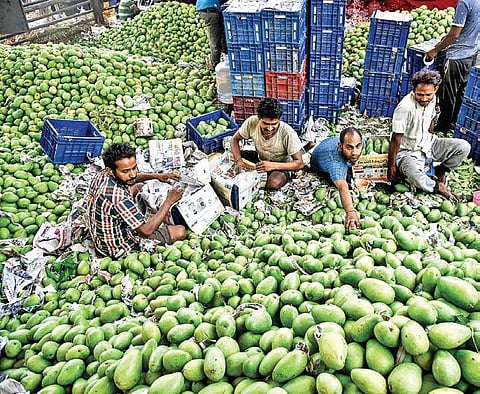

HYDERABAD: Though not a new trend, farmers leasing-in mango orchards in Telangana have been resorting to application of Paclobutrazol (PBZ or P333), a growth inhibitor compound, to achieve early flowering and higher yields. Though this seems to be a desirable workaround from a farmer’s short-term economic perspective, it has adverse short-term and long-term impact on mango trees and soil fertility.
Farmers in increasing numbers are turning towards PBZ as mango yield has been decreasing every year, mostly owing to climatic factors resulting in delayed flowering and poor crop management methods. PBZ is applied by infusing it in the soil around the mango trees post-harvest, to induce early flowering in the next season.
Mango trees have phytohormones called gibberellins, which are responsible for the division of cells, resulting in vegetative growth in the trees. PBZ inhibits the biosynthesis of gibberellins, making the flower inductive cycle commence earlier, which may seem attractive to mango growers. However, research has shown that due to the application of PBZ, the average weight of fruit reduces without affecting the yield, and its continuous application may cause pollution and its residual effect may increase in the fruit.
A research paper titled “Flowering Manipulation in Mango: A Science Comes of Age,” authored by Dr J Shankaraswamy in Journal of Today’s Biological Sciences: Research and Review in 2012 says that although fruit set and yield may be increased, the product produces a compressed panicle which doesn’t dry out very well and can develop powdery mildew or anthracnose even after a light dew.
Dr Shankaraswamy told Express that when PBZ is excessively applied to the soil, under certain conditions, subsequent growth and normal development could be severely disrupted. According to him, the residues of the compound remain in the soil for three years, affecting the vitality of the tree year by year.
Having studied extensive use of PBZ in Saurashtra region in the villages of Gir forest lying between Gujarat and Maharashtra, Dr Shankaraswamy said that the mango growers who had continuously applied PBZ for four years, had seen no flowering for two successive years.
In Telangana, PBZ sold with brand name ‘Cultar,’ is being used extensively by tenant farmers taking mango orchards on lease. For the sake of immediate gains, they have been overlooking the negative impact it has on the soil and the tree. Though there is not much research done on the impact of residues of PBZ in mango fruit on humans, Dr Shankar Swamy said that detection of residues on mangoes could be done by High-Performance Liquid Chromatographic (HPLC) techniques. Since these kinds of mangoes are not exported, much needs to be done to check the chemical residues of such compounds in mangoes that are domestically consumed.